International Motor Insurance Card System
An International Motor Insurance Card System is an arrangement between authorities and insurance organizations of multiple states to ensure that victims of road traffic accidents do not suffer from the fact that injuries or damage sustained by them were caused by a visiting motorist rather than a motorist resident in the same country.
Additionally to extending the insurance coverage territorial scope such systems have the benefit for motorists to avoid the need to obtain insurance cover at each of the frontiers of the countries which they visit.
There are multiple motor insurance systems around the world, established on regional basis. The first was the Green Card system established in 1949 in Europe, but later other regions followed suit.
Green card system
The Council of Bureaux (CoBx) maintains an international motor insurance card system in and around Europe where the certificate issued is known by the name Green card. In 1949 the system was established in the framework of UNECE. At later stage the EU and EFTA were involved and reflecting the deepening of the links with them the CoBx secretariat was relocated from London to Brussels in 2006.[1]
In each member state of the Green Card System the insurance companies established a Green Card Bureaux operating with the recognition and approval of the government and the activities of the Green Card Bureaux are established by law or regulation in each of the countries participating in the system. Each Green Card Bureau has two functions:
- As a "Bureau of the country of the accident", it has responsibility in accordance with national legal provisions for Compulsory Third Party Motor Insurance for the handling and settlement of claims arising from accidents caused by visiting motorists.
- As a "Guaranteeing Bureau" it guarantees certificates of Motor Insurance - ("Green Cards") which are issued by its member insurance companies to their policyholders.
There are three types of Green card member states as per the Multilateral Agreement:[2]
- EEA members
- members under section III of the Internal Regulations of the Council of Bureaux (which refers to the Multilateral Agreement) with the EEA members: Andorra, Croatia, Serbia and Switzerland.
- the rest of the Green card members
Membership and geographic limits

The Green Card System is primarily a European system. It presently includes most, but not all European countries, and some of their neighbors, in most cases bordering the Mediterranean Sea. The position of the CoBx is that the Green card system could be joined by the countries "west of the Urals and the Caspian Sea and countries bordering the Mediterranean Sea", but this rule is not followed strictly as Iran and Iraq fall outside of the area as described.
.svg.png) Belgium (1949)
Belgium (1949) Switzerland (1949)
Switzerland (1949) Czech Republic[3] (1949)
Czech Republic[3] (1949) Denmark (1949)
Denmark (1949) France (1949)
France (1949) Finland (1949)
Finland (1949) United Kingdom (1949)
United Kingdom (1949) Greece (1949)
Greece (1949) Ireland (1949)
Ireland (1949) Luxembourg (1949)
Luxembourg (1949) Norway (1949)
Norway (1949) Netherlands (1949)
Netherlands (1949) Sweden (1949)
Sweden (1949) Slovakia[3] (1949)
Slovakia[3] (1949) Germany (1951)
Germany (1951) Spain (1953)
Spain (1953) Italy (1953)
Italy (1953) Portugal (1953)
Portugal (1953) Austria (1954)
Austria (1954) Serbia[4] (1954)
Serbia[4] (1954) Poland (1958)
Poland (1958) Hungary (1960)
Hungary (1960) Turkey (1964)
Turkey (1964) Romania (1965)
Romania (1965) Israel[5] (1968)[6]
Israel[5] (1968)[6] Morocco[5][7] (1969)[8]
Morocco[5][7] (1969)[8] Tunisia[5][7] (1969)[9]
Tunisia[5][7] (1969)[9] Iceland (1970)
Iceland (1970) Bulgaria (1971)
Bulgaria (1971) Iran[10] (1976)[11]
Iran[10] (1976)[11] Malta (1985)
Malta (1985) Albania (1992)
Albania (1992) Estonia (1992)
Estonia (1992) Croatia (1992)
Croatia (1992) Slovenia (1992)
Slovenia (1992)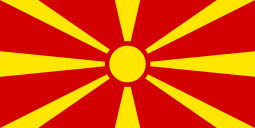 Macedonia (1994)
Macedonia (1994)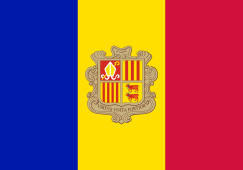 Andorra (1996)
Andorra (1996) Bosnia and Herzegovina (1996)
Bosnia and Herzegovina (1996) Cyprus (1996)
Cyprus (1996) Moldova (1997)
Moldova (1997) Ukraine (1997)
Ukraine (1997) Latvia (1998)
Latvia (1998) Belarus (2003)
Belarus (2003) Lithuania (2003)
Lithuania (2003) Russia[12] (2009)[13]
Russia[12] (2009)[13] Montenegro (2012)[14]
Montenegro (2012)[14] Azerbaijan (2016)
Azerbaijan (2016)
Additionally, insurance companies or national bureaux of some countries participate in the Green card system through foreign national bureaux:
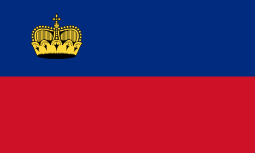 Liechtenstein through Switzerland
Liechtenstein through Switzerland Monaco through France
Monaco through France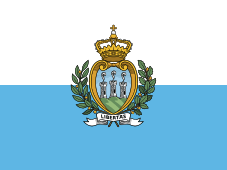 San Marino through Italy
San Marino through Italy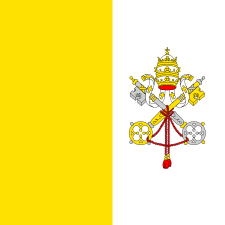 Vatican City through Italy
Vatican City through Italy
Former member states:
According to recommendation of the Management Committee of CoBx it is strongly recommended that the geographical scope of the Green card System should be restricted to the following additional states, in accordance with the European and Mediterranean rule: Algeria, Libya, Egypt, Lebanon, Syria, Georgia and possibly upon further consideration Armenia. Instead of expansion further than that, it is recommended to examine arrangements of cooperation with other motor insurance systems.[17] In 2012 it was decided to add Kazakhstan to the list of potential members since part of it lies west of the Urals.[15]
Countries that are currently candidates for membership are:
In 2008 the Economic Cooperation Organization asked the CoBx for cooperation and since some of its members are outside the geographical scope of the Green card system, it was suggested that the ECO members would establish their regional motor insurance system - the White card system. At the same time there are discussion whether the scope of the Green card system should be expanded to all UNECE members or to abandon geographical limitations in exchange for criteria based on the density of trade exchanged by road between the candidate country and the existing members of the System.
In 2011 Kosovo[19] submitted application for membership, but it was concluded that the conditions of vehicle license plate international recognition and UN membership are not fulfilled.[15]
The UNECE Afro-Eurasian[20] members states currently outside the Green card system are: Armenia (candidate), Azerbaijan (candidate), Georgia (candidate), Kazakhstan (potential candidate),[15] Kyrgyzstan, Tajikistan, Turkmenistan and Uzbekistan.
Other states, falling within the defined geographical scope of the Green card system (or participating in cooperation activities in the Mediterranean region such as the EMP and/or the UfM), but not participating are:
- Jordan[7]
- Mauritania[7]
- most of the states with limited recognition: Transnistria, Abkhazia, South Ossetia, Nagorno-Karabakh, Northern Cyprus, Palestine,[7] Sahrawi Arab Democratic Republic[7]
Orange card system
The Orange card system is established between most of the members of the Arab League and is applicable primarily in the Middle East and North Africa.
Participants are: Algeria, Bahrain, Egypt, Iraq, Jordan, Kuwait, Lebanon, Libya, Mauritania, Morocco (Green card member), Oman, Qatar, Saudi Arabia, Somalia, Sudan, Syria, Tunisia (Green card member), United Arab Emirates and Yemen.
The non-participating AL members are: Comoros, Djibouti and Palestine.
Blue card system
The Blue card system is established between the members of the ASEAN and is applicable in South East Asia.
Participants are: Brunei, Cambodia, Laos, Malaysia, Myanmar, Indonesia, Philippines, Thailand and Vietnam. [Singapore?].
Pink card system
The Pink card system is established between the members of the CEMAC and is applicable in Central Africa.
Participants are: Cameroon, Central African Republic, Chad, Congo, Gabon and Equatorial Guinea.
Brown card system
The Brown card system is established between most of the members of the ECOWAS and is applicable in Western Africa.
Participants are: Benin, Burkina Faso, Gambia, Ghana, Guinea, Guinea-Bissau, Ivory Coast, Liberia, Mali, Niger, Nigeria, Senegal, Sierra Leone and Togo.
The non-participating ECOWAS member is Cape Verde.
Yellow card system
The Yellow card system is established between most of the members of the COMESA and is applicable primarily in Eastern Africa.
Participants are: Burundi, DR Congo, Djibouti, Eritrea, Ethiopia, Kenya, Malawi, Rwanda, Sudan, Tanzania, Uganda, Zambia and Zimbabwe.
The non-participating COMESA members are: Comoros, Egypt (Orange card member), Libya (Orange card member), Madagascar, Mauritius, Seychelles, and Swaziland.
White card system
There is a proposal for the establishment of White card system between the members of the ECO, if the Green Card system territorial scope could not be expanded to include all of them.
Participants are: Afghanistan, Azerbaijan (Green card member), Iran (Green card member), Kazakhstan (Green card potential member), Kyrgyzstan (UNECE member), Pakistan, Tajikistan (UNECE member), Turkey (Green card member), Turkmenistan (UNECE member), Uzbekistan (UNECE member).
See also
- Green card (disambiguation) - for other uses of the term, besides a motor insurance certificate
References
- ↑ "CoBx history, 2006". Cobx.org. Retrieved 2013-06-09.
- ↑ "Green card system map". Cobx.org. Retrieved 2016-01-15.
- 1 2 Czechoslovakia joined the Green Card system in 1949. After dissolution in 1993 the Czech Republic and Slovakia remained members.
- ↑ SFRY joined in 1954 and its membership was later continued by FR Yugoslavia and finally Serbia
- 1 2 3 Mediterranean member of the Green card system.
- ↑ Israel was affiliate member between 1968-2003 when affiliate membership status type was abolished.
- 1 2 3 4 5 6 Member state or prospective member for both Green card and Orange card.
- ↑ Morocco was affiliate member between 1969-2003 when affiliate membership status type was abolished.
- ↑ Tunisia was affiliate member between 1969-2003 when affiliate membership status type was abolished.
- 1 2 Member of the Green card system that is located neither in Europe nor borders the Mediterranean Sea.
- ↑ Iran was affiliate member between 1976-2003 when affiliate membership status type was abolished.
- ↑ Report to UNECE, 2009 The new member states join the Green Card system with transitional status until monitoring over them is lifted.
- ↑ Russia applied for membership in 2002 and was candidate until 2009 when it joined the Green card system.
- ↑ Participating through Serbia until 2012.[15]
- 1 2 3 4 "ECE/TRANS/SC.1/2012/1 - (CoB) Report from the President" (PDF). Retrieved 2013-06-09.
- ↑ Iraq was affiliate member from 1982 until it was suspended in 1992 following UN sanctions. In 2003, with the abolition of affiliate membership status type, it was decided that members suspended for more than 5 years will have to rejoin following the regular procedure for new member states.
- ↑ "CoBx news, Issue No. 31 (May 2010)". Cobx.org. Retrieved 2013-06-09.
- ↑ "Report of the President of the Council of Bureaux, 2010" (PDF). Retrieved 2013-06-09.
- ↑ "CoBx note on Kosovo". Cobx.org. Retrieved 2013-06-09.
- ↑ North American members of UNECE are Canada and the United States.